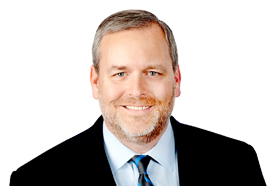Technological advancements continue to shape how healthcare is done in the 21st century, and healthcare systems that want to stay at the forefront of cutting-edge treatment must make acquiring those innovations a high priority. Yet operating on low margins, as healthcare organizations typically do, requires hard decisions on costs, which can limit or even thwart the acquisition of advanced equipment and treatments. Healthcare leaders who must constantly balance the need to make money with the need to invest in new medicines are forced by these challenges to frequently ask difficult questions and make difficult decisions.
As an insight into answering those questions, Grant Thornton Healthcare Industry Leader David Tyler talked with two prominent healthcare executives:
- Onyeka Nchege, senior vice president and chief information officer, Novant Health
- Tony Ambrozie, senior vice president and CDO/CIO, Baptist Health South Florida
Their webcast discussion was held recently in the Grant Thornton Crown Club Room, located at Spectrum Stadium, the home arena for the NBA’s Charlotte Hornets, in Charlotte, N.C.
4:23 | Transcript (PDF - 325KB)
Aligning strategy and cost
Tyler asked Nchege and Ambrozie their thoughts about how to align a strategy of containing costs with the goal of upgrading technology continually for better treatment options, which necessarily increases costs.
Nchege said that Novant Health has a responsibility to educate physicians to advance technological concepts within the space. And then how do we retain folks, right “We (have) kind of an all-hands-on-deck approach to how we deal with that at Novant Health.”
Ambrozie said his healthcare company, Baptist Health, is growing quickly, as Novant is, due to the increase in population in South Florida and that that rapid growth complicates planning for the incorporation of new technology. What that means in practice is to adopt new technologies into a healthcare organization through long-term planning, in keeping with an organization’s values, and to not be distracted by what is popular or by what others are doing.
“It comes back to—know the vision, define that vision, make it crystal clear and then understand what you need to get to that vision and then be able to prioritize that adequately,” Ambrozie said.
6:04 | Transcript (PDF - 483KB)
Improving processes with new perspectives
Tyler observed that Nchege and Ambrozie both came to their healthcare jobs with backgrounds in other fields and asked what challenges they saw, from their perspective, that were unique and distinct to healthcare.Ambrozie said healthcare does not have a traditional focus on consumers or consumer experiences and consequently can lack a focus on improving process efficiency --- not regarding clinical care, but about everything around it.
Moving into healthcare as Ambrozie did lead some colleagues to question his timing. But Ambrozie said he feels people like himself and Nchege were brought in from outside healthcare deliberately to bring new perspectives during that time, including applying technology to better support consumers.
“The same challenges we face in the healthcare space, we face in other industries,” Nchege said. When you see patients as “consumers” of healthcare, Nchege said you can bring an outsider perspective to healthcare based on experience in other industries.
“We're not doing technology for the sake of technology. We're saying, what outcomes? How is this going to look for consumers?” Ambrozie added. Focusing on that experience is the important thing, Ambrozie said, and that includes the experience of staff who may be burned out by inefficient operations.
“One of the reasons why I wanted to come into the healthcare space was to be able to impact lives in a positive manner,” Nchege said.
5:27 | Transcript (PDF - 435KB)
Big data challenges
Tyler said getting data for use in technology operations was only a first step and asked Nchege and Ambrozie for their perspective on making sure decision-makers in healthcare have and use what is discovered.
Nchege said the first step is to couple the data you obtain with the goals of the organization as driven by its leaders. For Nchege, education is the key – making sure people in the organization understand what is available. Then setting clear objectives for the use of that data is crucial – otherwise the organization is “building for the sake of building.”
Ambrozie focused on how data is more democratized with more employees having access to it. Ambrozie agreed with Nchege about the need for better education about and training to understand what organizational data shows “I think what we can also do is start with, ‘What is it that you're trying to solve in your operation?’ … and then we can walk back to the data and … slice it and dice it.”
Tyler agreed and added that one of the frustrations of that approach is to have the corporate resolve to make the observations gleaned from data studies actionable. Ambrozie said one way to help that is for healthcare organizations to see themselves as partners with patients – that a relationship exists where the desire to use what was learned from studies is there. Nchege said the intelligent use of data can help conversations about improvements go from anecdotes to fact-based conversations that can lead to confidence in solutions.
Contact:



Partner, Technology Modernization
Grant Thornton Advisors LLC
David has 30 years of experience primarily in the health system and health plan areas.
Atlanta, Georgia
Industries
- Healthcare
Service Experience
- Advisory Services
Trending topics

No Results Found. Please search again using different keywords and/or filters.
Share with your network
Share